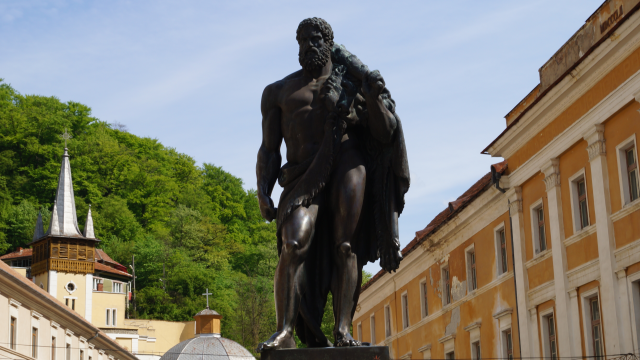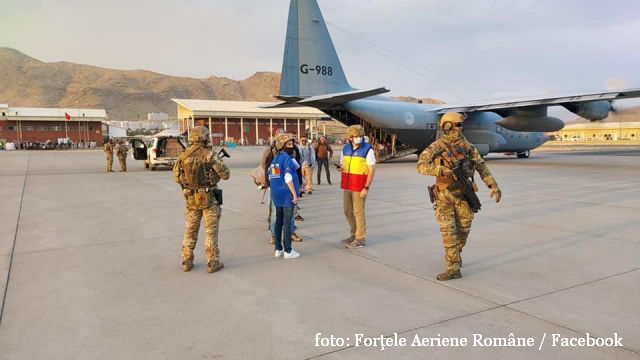Nous
voilà arrivés dans le sud-ouest de la Roumanie, à Băile Herculane,
ville balnéaire qui compte parmi les plus anciens lieux de cure d’Europe. Nous
allons donc découvrir une station thermale dont les eaux minérales possèdent
des vertus thérapeutiques qui ont été valorisées dès l’époque romaine, il y a
deux mille ans. Dans une région aux origines si anciennes, l’histoire et les
mythes seront nos guides privilégiés. En effet, la légende veut que le combat
entre Hercule, le héros de l’antiquité grecque, et l’Hydre à trois têtes ait eu
lieu ici même, dans la vallée de la Cerna, affluent du Danube, autrefois nommée
Lerne. Ce sont les Romains qui, il y a environ deux millénaires, y ont créé les
premiers établissements thermaux. Au XVIIIe siècle, les Autrichiens
sont ceux qui, après avoir redécouvert les effets thérapeutiques des eaux des
Bains d’Hercule, ont aménagé des espaces consacrés aux cures balnéaires.
Toujours grâce à eux, au XIXe siècle, le centre historique de la
station a vu le jour.
Selon Dan Buru, référent culturel au sein de la
Mairie de Băile Herculane, la première attestation documentaire de notre
destination remonte à l’an 153 : « Les Bains d’Hercule étaient la station thermale
préférée des classes aisées, d’abord des Romains, ensuite les aristocrates de
l’Empire d’Autriche. Après la Seconde Guerre mondiale, suite au développement
du tourisme, la station a gagné sa réputation parmi les touristes du monde
entier qui connaissaient la cure balnéaire pour toutes les maladies de
l’appareil locomoteur. A présent, la station s’est modernisée. On y trouve des
hôtels disposant de nombreuses facilités, comme des bassins de cure de haute
qualité qui proposent non seulement des traitements à base d’eaux thermales
riches en soufre, mais aussi des soins SPA et bien-être. Ces derniers
constituent des traitements modernes qui ne s’adressent pas aux personnes
malades, mais à celles qui souhaitent prévenir et combattre le stress. »
Si nous passons maintenant aux attractions touristiques
de la station, le centre historique en est sans doute l’une des plus
remarquables. On y découvre plusieurs pavillons érigés pendant la première
moitié du XIXe siècle et qui entourent la statue d’Hercule. À deux pas de là s’élèvent
d’autres monuments de patrimoine, comme le Casino, les Bains impériaux
autrichiens et la villa où séjournait l’impératrice d’Autriche-Hongrie
Élisabeth ou Sissi, qui s’était prise de passion pour les Bains d’Hercule et
pour les balades dans les environs de la station. L’un des sommets montagneux
qui surplombent la station et qui offre une vue impressionnante sur la Vallée
de la Cerna a d’ailleurs reçu le nom de l’impératrice.
Dan Buru, référent
culturel de la Mairie de Băile Herculane, mentionne les autres points forts de
notre destination : On parle d’une
station de montagne qui dispose également de nombreuses piscines. A la belle
saison, on peut bronzer au soleil et faire des randonnées en montagne. Les
paysages sont sublimes. En été et en automne notamment, tous les touristes
passionnés de randonnées, de cyclotourisme et de tourisme d’aventure sont les
bienvenus à Băile Herculane, car il y a ici des découvertes à faire et des
activités pour tout le monde. Nous avons également le privilège de conserver de
très nombreux bâtiments classés monuments historiques et qui datent de l’époque
de l’Empire Austro-hongrois. Ils se trouvent tous dans le centre historique de
la station et donnent un aperçu du tourisme de luxe pratiqué à Băile Herculane
à cette époque. Les dirigeants de l’Empire Austro-hongrois ne manquaient aucune
occasion de s’y rendre. Ce qui explique qu’en 1852 l’empereur François-Joseph affirmait
que cette station était la plus belle d’Europe.
Dans l’espoir que nous vous en aurons convaincus, nous
vous invitons à nous rejoindre de nouveau la prochaine fois pour une nouvelle
destination ! (Trad. : Ilinca Gângă)


